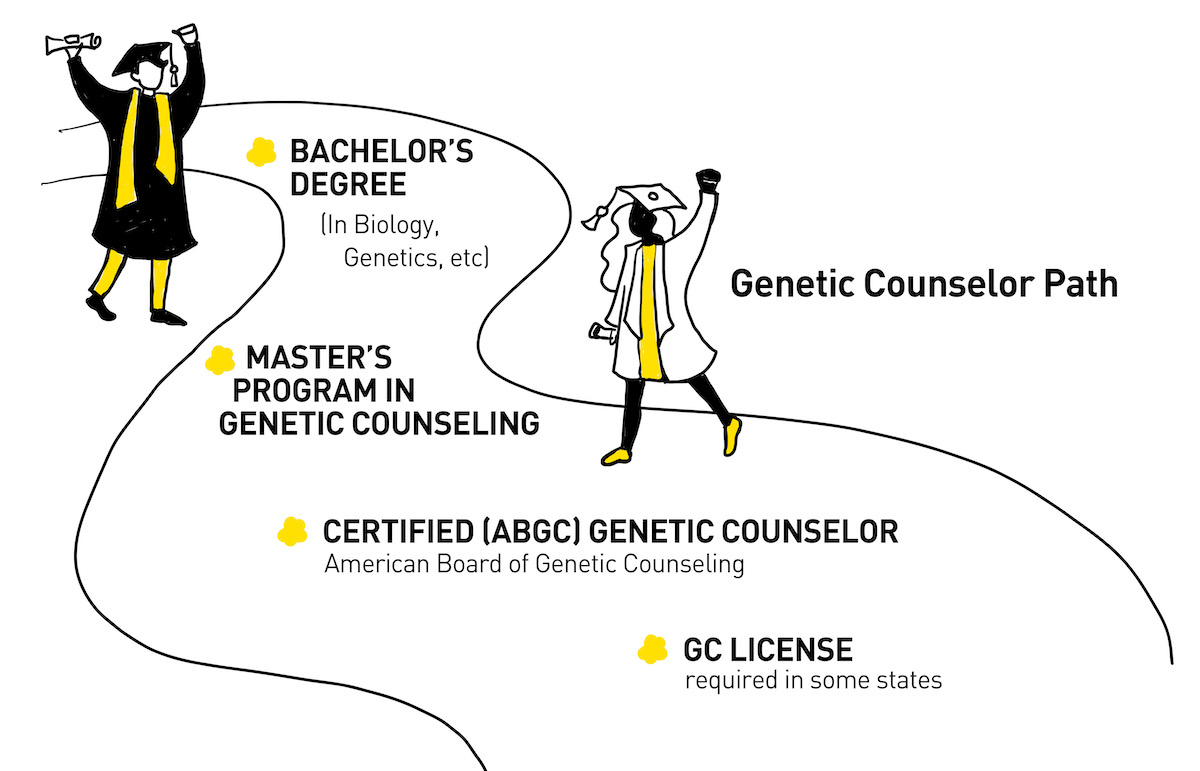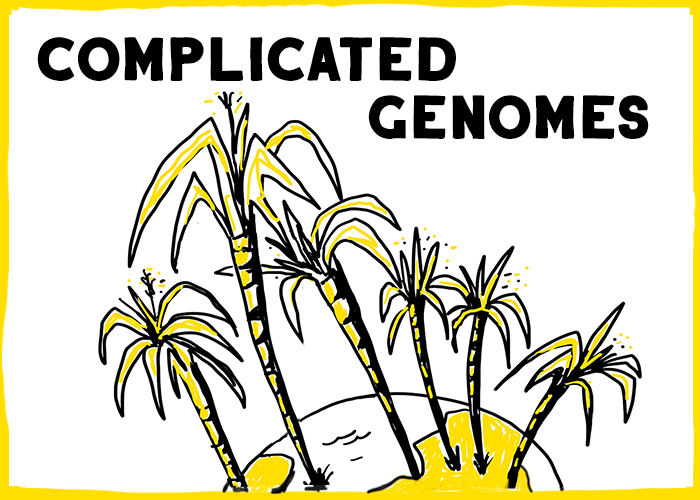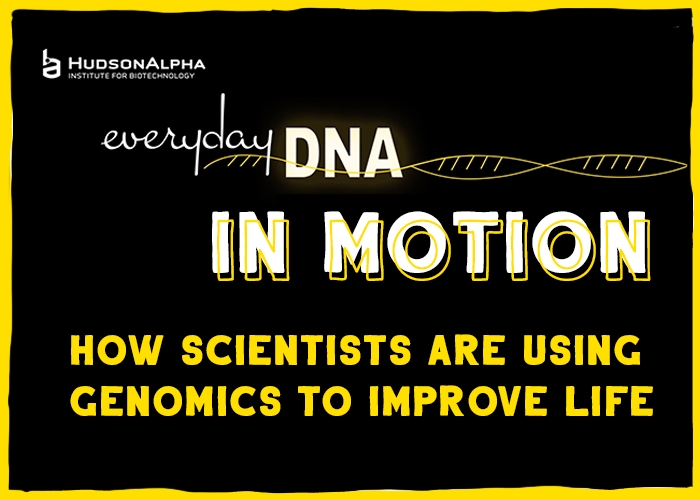An Everyday DNA blog article
Written by: Sarah Sharman, PhD
Illustrated by: Cathleen Shaw
The ability to sequence and analyze an organism’s DNA has revolutionized the field of biology, allowing researchers to understand how the genome functions and how changes in the genome affect all life on Earth. Careers in the fields of genetics and genomics are booming. In this Everyday DNA blog series, Careers in Genomics, we will learn about different career paths in genetics and genomics.
In recent years, healthcare has witnessed a remarkable rise in the use of genetic testing within clinical settings. The advancements in technology and our deepening understanding of the human genome paved the way for this transformative shift. Genetic testing, once reserved for rare genetic disorders, is now an integral part of medicine. It allows healthcare providers to unravel their patients’ intricate genetic blueprints to inform disease diagnosis, medication prescription, family planning, risk for actionable conditions like cancer and heart disease, and much more.
As scientists continue to unlock the secrets of our DNA, it is important that the individuals participating in genetic testing know the limits, applications, and implications of the genetic information they receive. Genetic counseling is a captivating field that blends scientific expertise with compassionate guidance to help empower individuals and families with the knowledge to make informed decisions about their genetic health and provide a roadmap through the intricate realm of genetics. Let’s learn more about careers in genetic counseling.
What is genetic counseling?
Genetic counseling is a specialized field in healthcare that involves providing information, support, and guidance to individuals or families who have or are at risk of having a genetic disease. The primary goal of genetic counseling is to provide information to individuals or families to help them understand genetic results, help them make an informed decision about their medical situation, and provide support in adapting to their condition or risk. Genetic counseling is often sought by individuals or families who: have a personal or family history of genetic conditions, have concerns about the risks of passing on a genetic disorder to their children, are planning a pregnancy, or are affected by prenatal testing results.
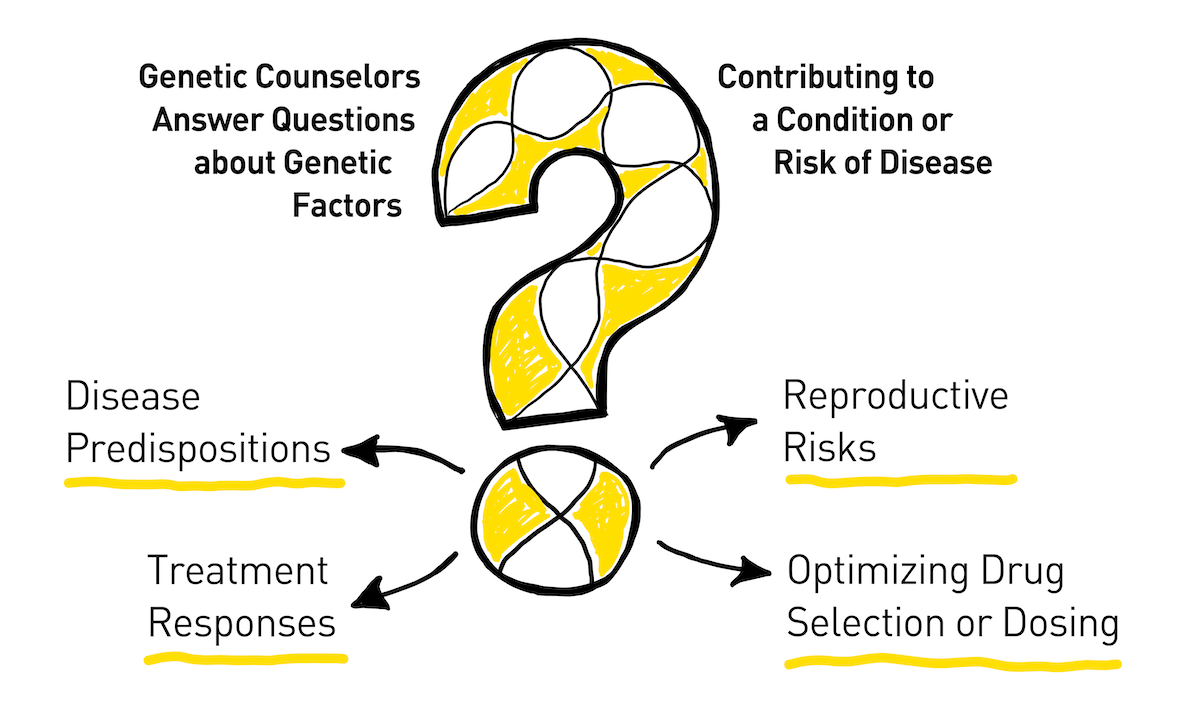 Genetic counselors are healthcare professionals with specialized training in medical genetics and counseling techniques. They work closely with patients to elicit patient goals and determine the most appropriate genetic testing approach to meet them. This includes assessing their personal and family medical history, preparing patients for the types of results they may receive, and providing education about the inheritance patterns and possible implications of genetic conditions. They are also skilled interpreters, providing clarity and understanding in the face of complex genetic data. Genetic counselors are not only experts in the science of genetics but also adept communicators who excel in conveying complex information in a digestible manner.
Genetic counselors are healthcare professionals with specialized training in medical genetics and counseling techniques. They work closely with patients to elicit patient goals and determine the most appropriate genetic testing approach to meet them. This includes assessing their personal and family medical history, preparing patients for the types of results they may receive, and providing education about the inheritance patterns and possible implications of genetic conditions. They are also skilled interpreters, providing clarity and understanding in the face of complex genetic data. Genetic counselors are not only experts in the science of genetics but also adept communicators who excel in conveying complex information in a digestible manner.
Genetic counseling extends far beyond the delivery of test results. Genetic counselors provide ongoing support, counseling, and education throughout the entire genetic testing process and beyond. They serve as compassionate guides, helping individuals and families adapt to the emotional, psychological, and practical challenges that may arise from genetic discoveries. They address individuals’ concerns and fears while assisting them in making informed decisions about their healthcare options, such as preventive measures, reproductive choices, and available treatment options. They also often engage in advocacy for their patient populations through developing publically available educational materials, facilitating patient support groups, developing research questions centered on the needs identified through their clinical practices, and supporting policies that are inclusive and in the best interest of their patients who often have rare and overlooked needs.
Like the genetics field itself, the field of genetic counseling is constantly evolving. Genetic counselors stay up to date with the latest advancements in the field through ongoing research and education. They may participate in research studies, attend conferences, train non-genetics providers on the application of genetics in their practice, and engage in professional development activities to enhance their knowledge and skills.
What is the day in a life of a genetic counselor like?
Genetic counselors work in various settings, such as hospitals, clinics, research institutions, and private practices. They collaborate with other healthcare providers to ensure comprehensive patient care. There are several specialty areas that genetic counselors can focus on, including but not limited to prenatal/preconception, pediatrics, oncology, cardiology, ophthalmology, hematology, and neurology.
A day in the life of a genetic counselor can vary depending on where they work and what their specialty is. Traditionally, genetic counselors spend much of their day meeting with patients and their families. They conduct interviews to gather detailed medical and family history information, discuss concerns, and provide education about genetic conditions or risks. They also perform genetic risk assessments and explain the results of genetic tests.
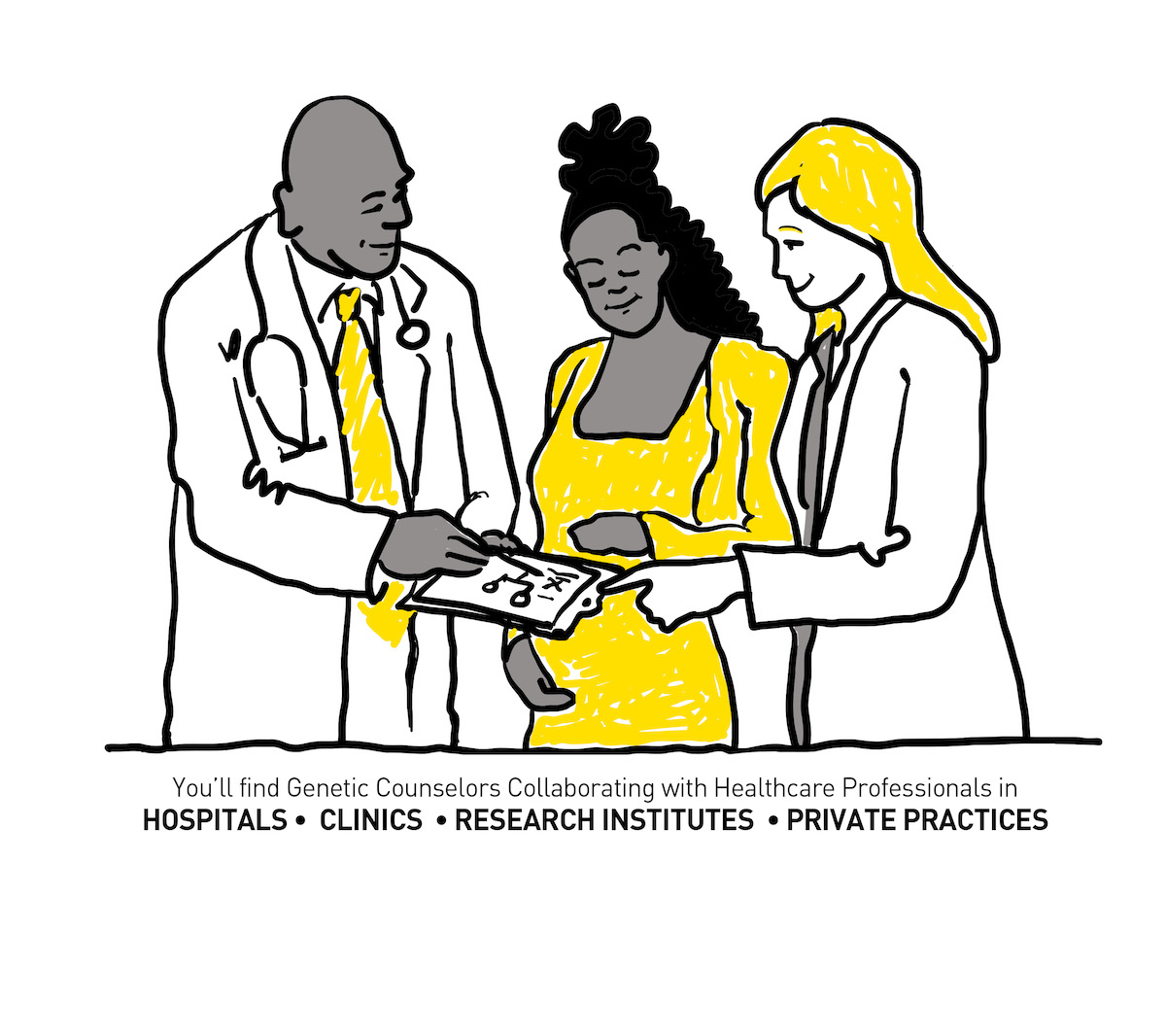 Alternative roles for genetic counselors that exist include assisting in education and genetic counseling programs, clinical interpretation of genetic variants or customer support for genetic testing labs, working in industry roles as subject matter experts for products and services related to genetics in health, working on research teams to advocate and care for patients and their families participating in clinical trials. The ability to apply genetic counseling skills in such a wide variety of settings and clinical specialties is a draw to the field.
Alternative roles for genetic counselors that exist include assisting in education and genetic counseling programs, clinical interpretation of genetic variants or customer support for genetic testing labs, working in industry roles as subject matter experts for products and services related to genetics in health, working on research teams to advocate and care for patients and their families participating in clinical trials. The ability to apply genetic counseling skills in such a wide variety of settings and clinical specialties is a draw to the field.
Genetic counselors coordinate the genetic testing process for their patients. They are experts in genetic issues that affect families and are very knowledgeable about the genetic tests available to assess for various diseases. Genetic counselors order appropriate genetic tests, explain the testing process, interpret test results, and discuss the implications of those results with the patient or family. They may also facilitate genetic testing for prenatal screening or pre-implantation genetic diagnosis.
Genetic counseling is a highly collaborative career. Genetic counselors work closely with other healthcare professionals, such as geneticists, physicians, nurses, and social workers. They collaborate to develop comprehensive care plans, provide appropriate referrals, and ensure continuity of care for patients. They may also collaborate with public health officials in support of genetic population screening guidelines.
Like many healthcare professionals, genetic counselors also spend time on administrative tasks. This includes documenting patient information, writing reports, maintaining patient records, and managing scheduling and administrative responsibilities. The specific activities and responsibilities of a genetic counselor may vary depending on their specialization and the setting in which they work.
How do you become a genetic counselor?
As the demand for genetic counselors grows, this dynamic and rewarding profession offers an opportunity to combine your love for genetics with the art of counseling, empowering individuals and families with crucial genetic insights. To become a genetic counselor, you must complete a master’s program in genetic counseling. Entry requirements for such programs vary and are often publically available on each program’s website. Common bachelor’s degrees for individuals pursuing genetic counseling include biology, genetics, psychology, and sociology. However, the specific degree track is not as important as accomplishing the required relevant coursework. A strong understanding of human genetics and biology lays the groundwork for a future career in genetic counseling.
Accredited master’s programs in genetic counseling offer a comprehensive curriculum, blending coursework, clinical rotations, and practical experiences to develop skills in genetic counseling. The program typically lasts around two years, allowing you to immerse yourself in various aspects of genetics, counseling techniques, ethics, and research.
After completing a master’s degree, the next step is to become a certified genetic counselor. The American Board of Genetic Counseling (ABGC) offers certification for genetic counselors who have met the necessary requirements, including the completion of an accredited program and the successful completion of a certification exam. Certification not only validates your expertise but also demonstrates your commitment to upholding professional standards. In addition to certification, some states may require genetic counselors to obtain a state license to practice independently.
Spotlight: HudsonAlpha Genetic Counseling Team
Of the 23 genetic counselors practicing in Alabama, HudsonAlpha Institute for Biotechnology proudly employs five. They specialize in genomics and work wearing hats in research, clinical, and educational initiatives to support the institute’s mission areas. They have the ability to leverage the synergy between these roles and apply genetic counseling skills in creative ways.
HudsonAlpha’s genetic counselors are vital members of several research programs focused on empowering individuals to learn about their health through their genomes, including SouthSeq and Information is Power. The team also works closely with HudsonAlpha Faculty Investigator Greg Cooper, PhD, and his lab to return results to patients enrolled in their research programs aimed at diagnosing rare diseases through genetic sequencing. Cooper’s lab has sequenced the genomes of more than 1,800 children with rare diseases, affording diagnoses to about 27 percent of patients. HudsonAlpha’s genetic counseling team is critical for the genetic counseling components of his projects.
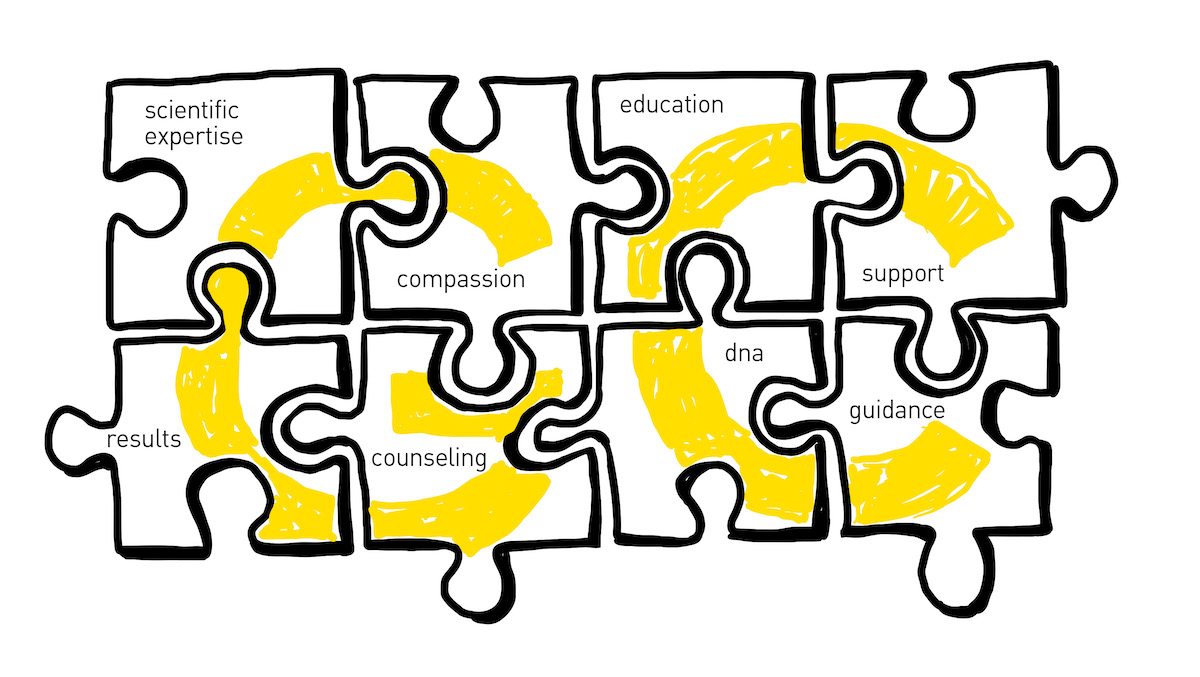 HudsonAlpha’s genetic counselors consult with patients at The Smith Family Clinic for Genomic Medicine, a stand-alone medical office residing on the HudsonAlpha campus that is devoted to the practice of genomic medicine. The clinic focuses solely on the diagnosis of rare and undiagnosed diseases using genomics. HudsonAlpha’s genetic counselors help patients and their families seeking answers from the clinic navigate the genetic testing process and understand any results they may gain from their genetic testing. Often rare diseases don’t have a cure or treatment, so genetic counselors help patients and their families accept their diagnosis and learn how to manage symptoms
HudsonAlpha’s genetic counselors consult with patients at The Smith Family Clinic for Genomic Medicine, a stand-alone medical office residing on the HudsonAlpha campus that is devoted to the practice of genomic medicine. The clinic focuses solely on the diagnosis of rare and undiagnosed diseases using genomics. HudsonAlpha’s genetic counselors help patients and their families seeking answers from the clinic navigate the genetic testing process and understand any results they may gain from their genetic testing. Often rare diseases don’t have a cure or treatment, so genetic counselors help patients and their families accept their diagnosis and learn how to manage symptoms
Some of HudsonAlpha’s genetic counselors also participate in research studies looking into best practices in the use of genomic advances in healthcare. A recent study looked at the possibility of training medical professionals like physicians and mid-level providers to return genetic results in light of the shortage of genetic counselors in proportion to the rise in genetic testing availability. Another study explored whether genetic testing is a useful supplement to family health history in screening for inherited disease risk. They have ongoing interests in population screening and alternative service delivery models. These types of research projects help to ensure the field of genetic counseling is current and cutting-edge as more genetic information becomes available to scientists and physicians.
HudsonAlpha’s genetic counselors are also passionate about educating the next generation of genetic providers, including genetic counselors, genetic residents, and nursing students. They offer several learning opportunities and internships for individuals interested in genetic counseling as a career. Their newest educational experience is Discover: Genomic Medicine, a 1-week summer program for rising 11th and 12th graders. Students will learn about how genomics is used to improve the diagnosis and care of patients. They’ll be given the opportunity to begin to develop foundational genomic medicine skills, including medical record review, pedigree building, and variant interpretation.

